Me and the sea: it’s a personal thing
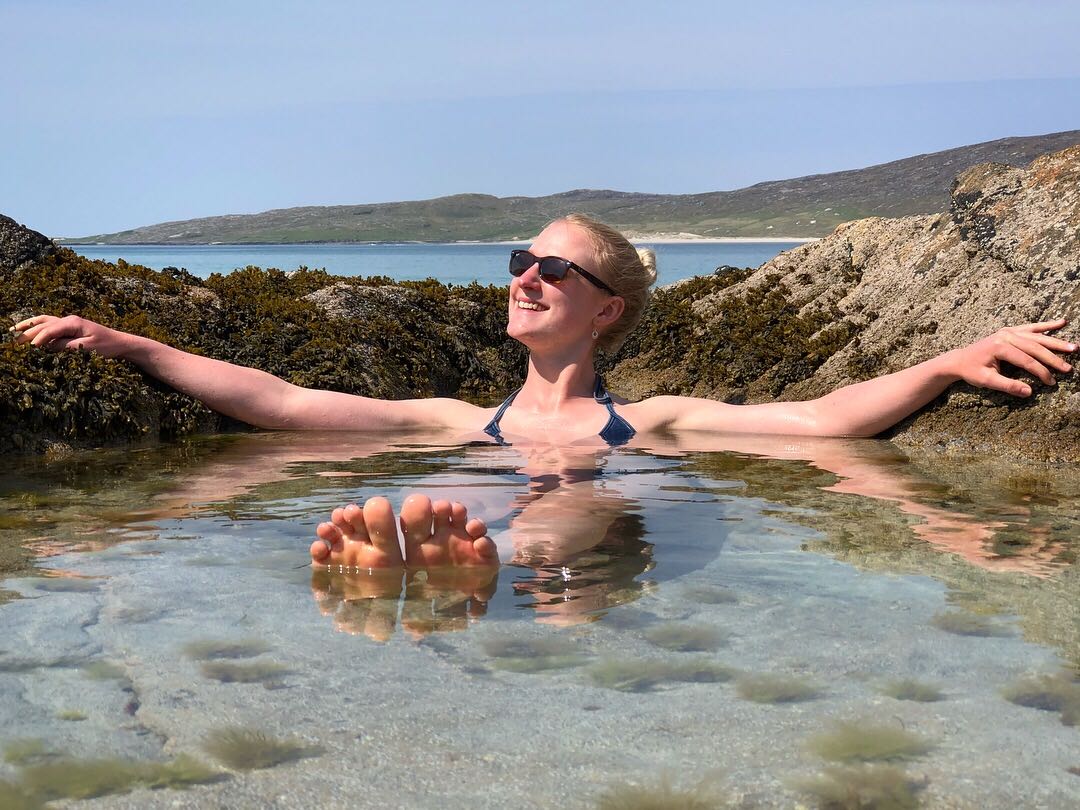
For National Marine Week, our Communications Manager Sarah Ford-Hutchinson – a surfer, snorkeler and freediver – explains what the sea means to her and why reducing harm to the ocean can be a private act.
Let’s start with the obvious: I’m a cliché.
I’m white, I’m blonde, I live in a privileged society and I have an Instagram account that’s awash with pictures of my frequent surfing, snorkelling and freediving adventures. (If you use Instagram, you’ll know that’s pretty common.) Often I write about where I’ve been and the things I’ve seen but not much else… I rarely post about ocean health.
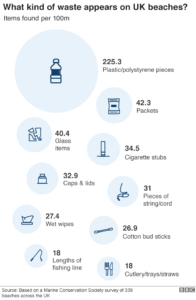
The top 10 items found on UK beaches during a Marine Conservation Society survey in 2017
Why? Online activism isn’t my thing.
I’ve been criticized for this before.
“How can you claim to love the sea if you don’t do everything in your power to save it?”
“Why don’t you talk about plastic? Wasted opportunity.”
I understand why, and it’s a fair criticism. The ocean is in trouble, and can’t get out of deep water on its own. It relies on human voices to explain the problems and work towards the solutions.
So why do I not talk about it online? In simple terms, it’s personal.
I have my fair share of pollution horror stories. The time I inhaled a shard of plastic through my snorkel and choked. Fell off my surfboard onto a cast iron metal buoy stranded in the sand. Swam through oil. Watched a gull feed its chick a bottle top. Found a gannet dead on the beach with a fishing line wound around its throat and wings. It’s all painful, dangerous, heartbreaking.
Although I recognize why it’s important for as many people as possible to see what’s going wrong in our seas, I’ve never felt able to share those horrible moments online.
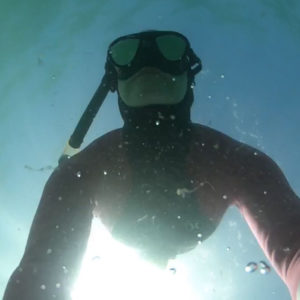 For me, being in the sea – in it, on it, part of it – is escapism from everything else. It’s a place of wonder, of solitude, a dangerous environment that requires your absolute attention. I am at my most mindful when duck-diving a massive wave or holding my breath long enough to let a seal come close… because if I break my concentration the moment is lost, the wave swallows me up and the seal moves on.
For me, being in the sea – in it, on it, part of it – is escapism from everything else. It’s a place of wonder, of solitude, a dangerous environment that requires your absolute attention. I am at my most mindful when duck-diving a massive wave or holding my breath long enough to let a seal come close… because if I break my concentration the moment is lost, the wave swallows me up and the seal moves on.
I use the sea to improve my mental health. I cannot think about anything else when I’m surfing, snorkeling or freediving; my brain stops whirring and kicks into a mode somewhere between adrenaline-seeking, pure survival and a state of zen. Like many others, I take “Vitamin Sea”, relying on time spent in cold water to give me the break I need to balance my moods and my emotions. I’m very thankful to the sea for that.
Swimming face first into a plastic bag is shit, especially when you’re not having a good day. But the disgust I feel is nothing compared to the harm being done to the blue lungs of the earth and the living things that rely on it. I talk to my friends about mental health and plastic pollution, take action to improve both and encourage them to do the same… but I choose not to talk about those things online.
The reason is: just like the sea, Instagram is a bit of escapism for me too. I don’t like seeing plastic in either. I filter my environment as a coping mechanism for the anxiety I have in myself and the eco-anxiety I have for the planet.
The sea gives me stability; I give back by picking up rubbish on any beach I go to, eating certified fish, using less plastic, donating to marine charities, signing petitions, finding other ways to care more. I don’t shout about it, but I do care.
I absolutely support every ambassador for ocean health – and mental health – who share their story to persuade others to help protect the watery place we all rely on more than we know. You have influenced me in so many ways. I hope you don’t think less of me that I choose to influence others offline, and use my online space like I use the sea – to escape.
I recognise the irony in this: I am a Communications Manager who is too emotional about the sea to talk very often about saving it. I’m trying to get better, hence this blog. I’m also always learning how I can do more to protect the place that protects me.
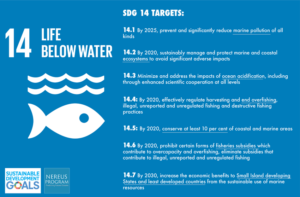
SDG 14, life below water: 7 targets in the next 10 years
This National Marine Week, I encourage you to have your own encounter with the sea, improving its health as well as yours. Join a beach clean. Swim at Porty and pick up plastic. Smell the salty air over your soy latte at Shore while signing up for surf lessons and donating to ocean charities. You might post a picture or you might not, but whatever you do, make a promise to yourself and the sea to have a more positive impact.
Back in 2010 National Geographic published “10 things you can do to save the ocean”, and they still hold true. I’ll be thinking and acting on these 10 things this week, and continuing to do so every week after. And that’s what it’s all really about…. doing something. Doing something better and making a difference, whether that’s a private action or encouraging millions of other people to do so too.
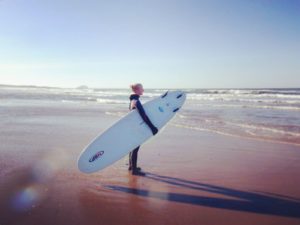
Whether you’re a Instagramless land-lubber or the next Brinkley Davies… do your thing. Just do it more responsibly and tell others in whatever way works for you.
For the sake of the ocean and every other living thing that relies on it.
Tweet Sarah at @Sarah_FordHutch
Find out more about National Marine Week at https://www.wildlifetrusts.org/get-involved/campaign/national-marine-week





Recent comments